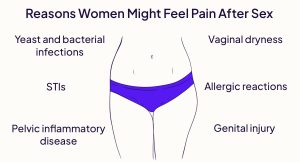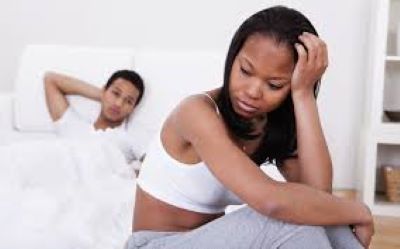For many women, sexual intercourse is an enjoyable and fulfilling experience; but for some, it can bring about sharp pain in the anus and lower abdomen afterwards.
According to physicians, this pain can be very uncomfortable and can affect a woman’s quality of life.
In this article, experts discuss the possible causes of the pain and the treatment options available.
What is pain after intercourse called?
According to the Center for Vascular Medicine, pain after intercourse, also known as dyspareunia, is a term used to describe persistent or recurrent pain that occurs during or after sexual activity.
“It is important to recognize that dyspareunia can affect both men and women, but it is more commonly reported by women,” specialists at Cleveland Clinic counsels..
Causes of dyspareunia — Physical causes
Anal fissures: Small tears or cuts in the lining of the anus can occur, causing sharp pain, especially during bowel movements or intercourse.
According to medics at Johns Hopkins Medicine, anal fissures are tears, or cracks, in your anus.
 “Fissures are sometimes confused with hemorrhoids, which are inflamed blood vessels in, or just outside, the anus. Both fissures and hemorrhoids often result from passing hard stool,” they say.
“Fissures are sometimes confused with hemorrhoids, which are inflamed blood vessels in, or just outside, the anus. Both fissures and hemorrhoids often result from passing hard stool,” they say.
In addition, experts say certain factors raise the risk for anal fissures, including:
• Constipation with straining to pass hard stool.
• Eating a low-fiber diet.
• Intense diarrhoea.
• Recent weight loss surgery, because it leads to frequent diarrhea.
• Vaginal childbirth.
• Minor trauma, especially trauma caused by high-level mountain biking, etc.
Pelvic Inflammatory Disease (PID): An infection of the female reproductive organs, often caused by sexually transmitted bacteria, can lead to pelvic pain and discomfort.
The National Health Service notes that most cases of PID are caused by a bacterial infection that’s spread from the vagina or the cervix to the reproductive organs higher up.
“Many different types of bacteria can cause PID. In many cases, it’s caused by a sexually transmitted infection (STI), such as chlamydia or gonorrhoea,” NHS says.
Muscle spasms: Spasms in the pelvic floor muscles may occur, causing pain during or after intercourse, experts say.
According to Cleveland Clinic, one or more of the following may be to blame for muscle spasms in most cases:
- Not enough stretching
- Muscle fatigue
- Exercising in extreme heat (heat cramps)
- Dehydration
Electrolyte imbalance: According to WebMD, electrolytes are chemicals naturally occurring in our body fluids. They include chloride, phosphate, potassium, sodium, and calcium, and they are important for normal body functions and should be present in certain concentrations.
When the level of electrolytes in the body is too low or too high, the resulting condition is called an electrolyte imbalance; yet, maintaining an electrolyte balance is vital for your body to function smoothly.
An electrolyte imbalance is caused when you lose a large amount of body fluids. For example, if you are sweating or vomiting too much, it can lower the levels of some electrolytes in the body.
In fact, when you’re sweating, you lose 2% to 6% of your body weight. If you do not hydrate sufficiently, sweating can lower electrolyte concentration.
Here are some other causes of an electrolyte imbalance:
- Not eating and drinking enough
- Chronic respiratory diseases
- Metabolic alkalosis, a condition in which your blood pH is higher than normal
- Medications, such as laxatives and steroids
Gastrointestinal concerns: Conditions like irritable bowel syndrome (IBS) or inflammatory bowel disease (IBD) may cause pain in the lower abdomen and can be aggravated by intercourse.
Infections: Genital infections, including sexually transmitted infections (STIs), can cause pain after intercourse.
Vaginal dryness: Insufficient lubrication can lead to friction and discomfort. This may be related to hormonal changes, medications, or insufficient arousal.
Endometriosis: According to Endometriosis Foundation of America, this condition involves the growth of uterine tissue outside the uterus, and it can cause pain during and after intercourse.
Structural causes:
Uterine fibroids: Non-cancerous growths in the uterus may contribute to pain during intercourse.
Ovarian cysts: Fluid-filled sacs on the ovaries can cause discomfort, especially during sexual activity.
Psychological causes — Stress and anxiety: Psychological factors, such as stress, anxiety, or a history of trauma, can contribute to pain during intercourse.
Relationship concerns: Emotional factors and relationship concerns may impact sexual well-being.
Conclusion
Physicians say there are several potential reasons why someone might experience sharp pain in the anus and lower abdomen after intercourse. So, if you are experiencing persistent or severe pain, you should seek medical advice from a healthcare professional for an accurate diagnosis and appropriate treatment.
“It’s crucial to consult with a healthcare professional to determine the exact cause of the pain. They may perform a physical examination, order tests, or conduct imaging studies to make an accurate diagnosis.
“Treatment will depend on the underlying cause, and your healthcare provider can recommend appropriate measures to address the concern,” General Practitioner, Dr. Lucy Samson says.


